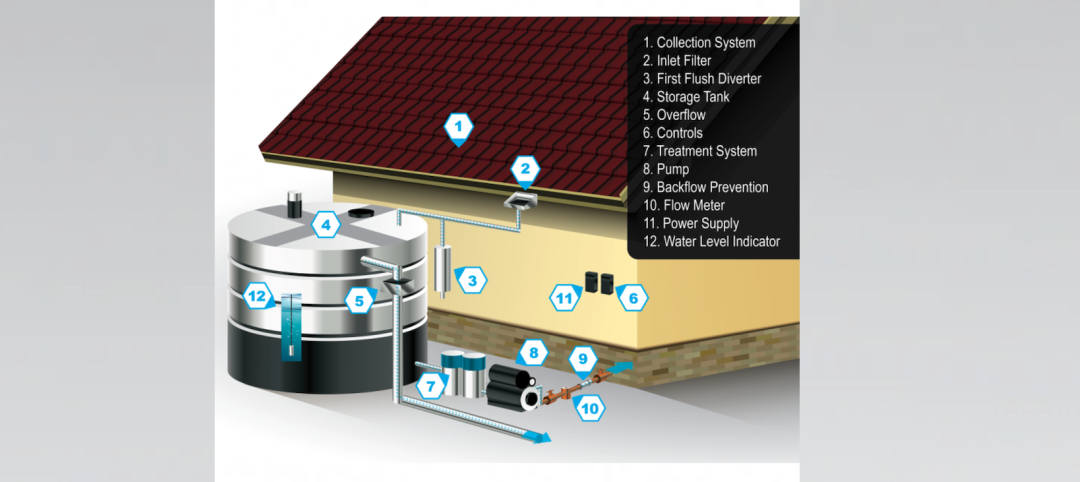Maryland's Prince George's County must comply with a federal "pollution diet" to clean up the Chesapeake Bay. Over the next 10 years, the county must convert 15,000 acres of watertight surfaces—almost 5% of the county's total area—into surfaces that absorb or treat rainwater.
That will require adding some 46,000 stormwater devices. The county is turning to a novel approach to get the rain gardens, cisterns, permeable pavements, and other devices for filtering and absorbing stormwater built.
These features are geared to slow the rapid runoff from roads and rooftops in order to reduce pollution that flows into sewers and which then makes its way into the bay.
Its partnership with Corvias Solutions, which is in charge of designing, building, and maintaining the improvements, has been hired to convert 2,000 acres by 2017. If the company performs well, that amount could double.
The county will also have its own team of workers to work on another 2,000 acres. Officials will be able compare the performance of the two teams and then decide how to proceed.
Related Stories
Standards | Jan 31, 2023
Standard establishes best practices for rainwater and stormwater harvesting system
The market is seeing an increasing number of residential, commercial, and industrial rainwater and stormwater systems being installed.
Green | Jan 26, 2023
Corporations fall short on climate pledges by failing to embed net-zero actions into operations
Many corporations are failing to implement simple, practical steps needed for them to hit their stated decarbonization goals, according to a survey of more than 300 operations managers across key industrial sectors including construction, energy, and chemicals in the U.S., U.K., and Germany.
K-12 Schools | Jan 25, 2023
As gun incidents grow, schools have beefed up security significantly in recent years
Recently released federal data shows that U.S. schools have significantly raised security measures in recent years. About two-thirds of public schools now control access to school grounds—not just the building—up from about half in the 2017-18 school year.
Concrete | Jan 24, 2023
Researchers investigate ancient Roman concrete to make durable, lower carbon mortar
Researchers have turned to an ancient Roman concrete recipe to develop more durable concrete that lasts for centuries and can potentially reduce the carbon impact of the built environment.
Government Buildings | Jan 9, 2023
Blackstone, Starwood among real estate giants urging President Biden to repurpose unused federal office space for housing
The Real Estate Roundtable, a group including major real estate firms such as Brookfield Properties, Blackstone, Empire State Realty Trust, Starwood Capital, as well as multiple major banks and CRE professional organizations, recently sent a letter to President Joe Biden on the implications of remote work within the federal government.
Multifamily Housing | Jan 9, 2023
New York City advances plan to build 500,000 new housing units
After New York Mayor Eric Adams announced a “Moonshot” plan to build 500,000 new housing units over the next 10 years in early December, he moved quickly to jumpstart the process.
Sustainability | Jan 9, 2023
Innovative solutions emerge to address New York’s new greenhouse gas law
New York City’s Local Law 97, an ambitious climate plan that includes fines for owners of large buildings that don’t significantly reduce carbon emissions, has spawned innovations to address the law’s provisions.
Codes and Standards | Jan 9, 2023
EPA reverses course on clean water rule changes enacted by Trump administration
After long legal battles and extensive debate over the expansiveness of the Clean Water Act, the Environmental Protection Agency repealed changes enacted by the Trump administration.
Multifamily Housing | Dec 29, 2022
San Jose is largest U.S. city to abolish minimum parking for new housing
San Jose, Calif., recently became the largest U.S. city to strike down minimum parking requirements for new housing development. The city reversed zoning devised in the 1950s that reputedly gave it the worst sprawl of parking space in northern California.
Codes and Standards | Dec 29, 2022
New York City multifamily owners concerned over fires caused by e-bikes
In 2022, there have been nearly 200 fires and six deaths in New York City caused by lithium-ion batteries used in mobility devices such as electric bikes and scooters.

















